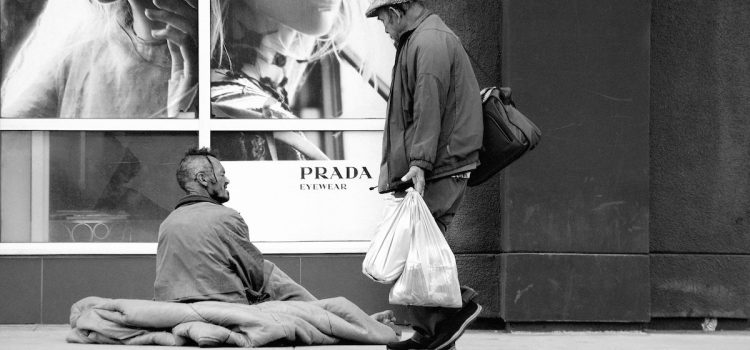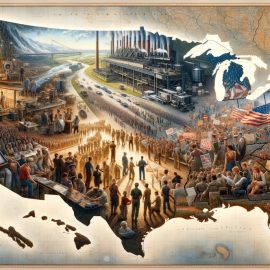

This article is an excerpt from the Shortform book guide to "Enlightenment Now" by Steven Pinker. Shortform has the world's best summaries and analyses of books you should be reading.
Like this article? Sign up for a free trial here.
What is the status of—and the outlook for—the global distribution of wealth? Are the rich getting richer and the poor getting poorer?
Steven Pinker wants to set the record straight on wealth and inequality in the world. He presents compelling data regarding inequality, poverty, and social spending that might come as a surprise to many.
Continue reading to learn Pinker’s argument and for a brief discussion of the prospect of a Universal Basic Income.
The Global Distribution of Wealth
Pinker says that it’s a mistake to think that inequality in itself is a bad thing. He argues that inequality in the global distribution of wealth isn’t a problem in itself because it doesn’t matter how much money rich people have as long as everyone has enough. For example, if the richest people in society triple their wealth and the poorest people double their wealth, that may make the inequality between the richest and the poorest greater, but it still means everyone is better off. So the problem, he says, is poverty, not inequality. A more equal society isn’t necessarily good either, he argues, because the things that tend to level societies are tyrannical leaders, war, disease, and state collapse.
Pinker says the idea that “as the rich get richer, the poor get poorer” is actually false. The data shows that, all around the world, the rich have indeed gotten richer and the poor have also gotten richer, just to a lesser degree. Historically, Pinker tells us, worldwide inequality increased dramatically starting with the Industrial Revolution because that allowed some people to get very rich on others’ labor, creating major class gaps. But, since then, wealth has become more equally distributed again, as people in all classes have prospered.
The overall global pattern, Pinker says, shows that the lower and middle classes of poorer countries have improved their conditions steadily, along with the upper classes of richer countries. The lower-middle classes of the rich countries have not improved as much, though, and he argues that this causes Americans and Europeans (particularly in those classes that haven’t fared as well) to think conditions are not getting better. But Pinker says the U.K. and U.S. lower-middle classes just happen to be the worst off as far as gains. But, he says that, when we focus on the big picture, “the trade-off is worth it.”
(Shortform note: It can also be argued that inequality in wealth creates inequality in power, and that means the very wealthy tend to have a disproportionate amount of influence over the political process. And when this is inherited wealth, it can create a situation much like a nobility, with generations of families becoming a ruling class. Improving the economic situation of the poor and working class would not necessarily eliminate this power imbalance problem if the people at the top of the social structure still have vast amounts of wealth that those at the bottom never come close to reaching.)
Poverty Alleviation
One major mechanism for poverty alleviation in developed countries is taxation systems that charge a greater proportion to the wealthier groups and distribute it to the poorer ones through social programs, which Pinker says is a feature of modern capitalism. He says pre-modern/pre-capitalist societies did much less to help the poor.
Since the middle of the 20th century, social spending in developed countries has increased dramatically. Of these countries, Pinker says, the U.S. is notoriously resistant to social spending, with conservatives and libertarians always trying to limit it. And still, he says, the U.S. spends 19% of its GDP on social services. By comparison, Pinker notes that Indonesia spends 2% and India 2.5% of their GDP on social services.
(Shortform note: Still, the U.S. lacks many social services that most of the developed world has, like government-subsidized health care and child care and mandatory paid leaves. Some suggest the lack of public support for expanding social services in America is due to entrenched racism in American culture. Beliefs that these programs would disproportionately serve people of color create resistance from the white majority and from the wealthier classes that hold stereotypes about welfare recipients.)
Pinker points out that some European countries (for example, Germany and the Scandinavian countries) have fared better than others and better than the U.S. because they have more robust social welfare systems, ensuring that everyone has a decent standard of living. He believes that universal basic income may be the next historical trend we’ll see to prevent poverty.
| Is Universal Basic Income Realistic? Universal Basic Income (UBI) is a controversial topic, but there’s growing support for the idea worldwide. Generally, the idea is that the government gives a specific amount of money to the citizens each month to subsidize their cost of living. This sometimes comes with stipulations, such as the requirement that you must be working or actively seeking employment to qualify. Norway is the only country that currently has a national UBI for all citizens, and Brazil has UBI for the poorest citizens. But many other countries have considered it, and there have been a few pilot experiments with it in Finland, Canada, and the U.S. The city of Stockton, California ran a two-year experiment by giving all residents $500 per month—without any stipulations. Despite the common belief that UBI would encourage people to be lazy and not work, this experiment found that even this small amount increased the overall well-being of residents, and increased the rate of full-time employment. Other experiments have shown similar results. When people have enough money to meet their needs without constant stress, they have the time and energy to seek out full-time work in more satisfying jobs. The major challenge of UBI is the question of how to fund it. Taxation is the most obvious answer, but that can work in different ways—for example, through diverting funds from other areas of the national budget, or by increasing taxation on corporations or citizens. Facebook co-founder, Chris Hughes, argues in his book Fair Shot, that the wealthiest citizens of society, like himself, should pay for a UBI for the less wealthy. |

———End of Preview———
Like what you just read? Read the rest of the world's best book summary and analysis of Steven Pinker's "Enlightenment Now" at Shortform.
Here's what you'll find in our full Enlightenment Now summary:
- How the world is actually getting better, not worse, over time
- Why people think the world is worse off than it is
- What Enlightenment values are and where they come from






